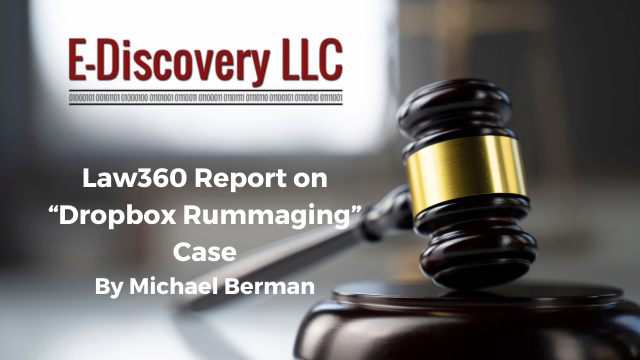
[EDRM Editor’s Note: The opinions and positions are those of Michael Berman.]
I previously wrote about the “Dropbox Rummaging” case. Please see “Self Help” Discovery in Someone Else’s Dropbox is Held to be Sanctionable (Nov. 10, 2023), and Sanctions Update in Dropbox “Rummaging” Decision (Dec. 1, 2023).
In Robins Kaplan File Flub Bad Look For Both Sides, Panel Says – Law360 (May 8, 2024), Rachel Scharf reported on the appellate challenge to the $160,000 sanction in the $10 million dispute.
“[t]he panel appeared skeptical,” asking why there was a ten-day delay in the receiving party giving notice to the producing party.
Rachel Scharf, Robins Kaplan File Flub Bad Look For Both Sides, Panel Says – Law360 (May 8, 2024).
Ms. Scharf reports that the sanctioned firm argued that it “had done nothing wrong because it only looked at Dropbox files that were discoverable and ultimately produced by Pursuit.” It argued that there was no finding that any of the documents it reviewed were privileged.
However, Law360 reported that “[t]he panel appeared skeptical,” asking why there was a ten-day delay in the receiving party giving notice to the producing party.
The article also describes that the panel asked “tough questions” of the producing party.
One Justice expressed “shock” that “Pursuit’s lawyers didn’t immediately ring alarm bells about the Dropbox link after being copied on the subpoena return.”
Ms. Scharf reported that the response to that question was that notice was not given until the opponent sent a letter “telling us that they had reviewed it,” and “explaining that her firm processed the discovery through a specialized review platform.”
A Justice responded: “So that tells me that whoever was looking at this wasn’t tapping on the links, … I just — I’m sorry, I don’t understand that. I really don’t understand.”


